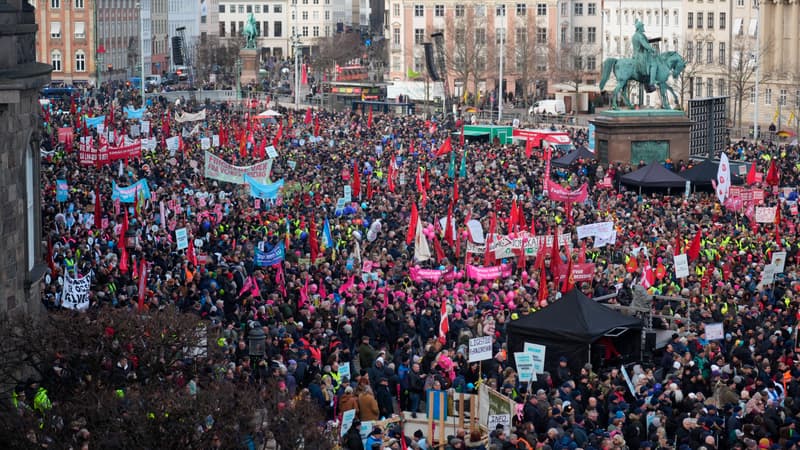In Denmark, the government’s project to abolish a public holiday does not happen with many of the country’s inhabitants, who have decided to go out on the streets this Sunday. A rare fact that is not in their habits.
The movement is led by the Confederation of Danish Trade Unions (FH), which has 1.3 million members, or almost a quarter of the 5.9 million population. Several thousand people gathered this Sunday in front of the Danish parliament in Copenhagen. “Preserve our vacations”, “Undemocratic nonsense”, “Vote no”… could be read on the different posters.
“It is a big threat to the Danish model. Politicians should stay out of issues that concern work. And there, they will simply impose themselves and violate our agreements ”, Lizette Risgaard, president of FH, protested at the end of January.
“No financial margin”
Led by Social Democrat Mette Frederiksen, the center-left-center-right coalition government is seeking to abolish a public holiday, “the great day of prayers,” an institution since the late 17th century that falls each year on the fourth Friday after Easter. .
The reason given is to achieve in 2030, instead of 2033, the objective set within NATO of devoting at least 2% of GDP to the defense budget. An acceleration in itself motivated by the consciousness born of Russia’s invasion of Ukraine. The measure implies 7.4 more hours of work per year, the government said.
“I don’t think it’s a problem having to work an extra day,” said Mette Frederiksen. “We have to face huge defense and security expenses, in health, psychiatry and green transformation”, she justified during her general policy speech. “And there is no financial margin.”
For the union and many economists, the argument does not hold up. To return the expected 3 billion crowns (403 million euros) to state coffers, Danes would have to agree to work one more day and their employers agree to give them an equivalent wage increase.
However, the existence of this holiday, and its salary consequences for those who work or are unemployed on that day, is included in collective agreements, a sacrosanct institution in the Scandinavian country.
A protest ten years ago
A petition put online by FH has collected nearly half a million signatures. Only the three government parties, with a majority in Parliament, support the measure. The Church and organizations representing the military also protested vehemently.
In Parliament, the nine opposition parties, from the far left to the far right, have said they refuse to participate in a new defense policy deal if the government does not back down.
Ten years ago, a social democratic government had already tried to abolish this holiday. Before surrendering to a cry.
Source: BFM TV


